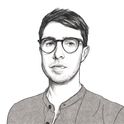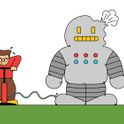James Bridle is on a residency in Dublin when we speak over Zoom—an appropriate medium given the artist’s interest in technology and artificial intelligence. Very quickly, however, it becomes clear that climate change occupies much more of Bridle’s thinking these days. Originally from London and born in 1980, Bridle (who uses they/them pronouns) has lived on a Greek island for the past seven years: when they first arrived there with their partner in 2015, “it was a place where it felt possible to be more deeply, directly involved in things,” they tell me. “The future is in the deep ocean. It’s in the desert, in the Arctic. Because those are the places that are changing the fastest.”
Bridle studied computer and cognitive science at university. By the time they graduated, they had grown to “hate computers,” and so decided to seek out a career in traditional book publishing. It didn’t take long however before “technology started to creep back in,” Bridle says, “and the internet became something in everyday life, rather than just for nerds.” Through witnessing the rise of ebooks and Kindle, Bridle slowly became “interested in what it meant for literature to become digital, and really for everything to become digital.”
Bridle turned to conceptual art and—a decade of projects later—published New Dark Age, a book about the impact of the internet, AI and new technologies, none of which, Bridle says, have lived up to their “early utopian ideas.” Looking at the traumatic implications of technology for climate change in particular—they cite Google assisting oil companies to better exploit dwindling reserves through AI—is what motivated Bridle to write a different kind of book.
That book, Ways of Being, builds on Bridle’s thinking in New Dark Age, looking at all sorts of non-human intelligence: whether it’s the “problem-solving abilities of primates, the mathematical abilities of micro-organisms like slime moulds, or the abilities of plants to hear and remember.” The conclusion Bridle reaches is that most definitions of intelligence are inherently anthropocentric. Instead, we should regard intelligence as something that “arises as a result of our interactions and relationships with other beings.”
Bridle suggests this idea is not as radical as it sounds. “Everyone’s had the experience of visiting a place and remembering something that happened there, and that memory not really being accessible to you until you were in that place,” they tell me. “That’s an example of this kind of distributed cognition, where your mind is embedded in the world around you.” For Bridle, humans must share the world with other intelligent lifeforms rather than seek to control and categorise them—as we have been doing for so long, and with such dire climatic consequences.
Admittedly, at some points in our discussion I begin to find some of Bridle’s thoughts on what intelligence means a little tricky to untangle. But they stress that the point to remember here is that we shouldn’t expect to become all-knowing about all types of non-human intelligence. “We can’t necessarily understand what it’s like to be grass or a tree or an ocean. We can’t know that because we’re humans, we’re embodied in a particular type of way and understand what it means to be intelligent in a particular way.” The point is to reintegrate ourselves “with the more-than-human world”—and art, with its ability to make us feel “in other ways than we might have expected,” could help us get there.
Bridle’s next project is to try and create a computational system using rare plants discovered in northern Greece that have adapted to grow in alloy-rich soils, meaning they can be harvested for metal. These plants “have evolved a particular capability in relationship to a particular place that allows them to do something that takes humans dynamite and oil and huge holes in the earth to accomplish,” Bridle says. “And they’re doing it in a far more regenerative and equitable way. And I see that as a form of knowledge that we can learn from.”













